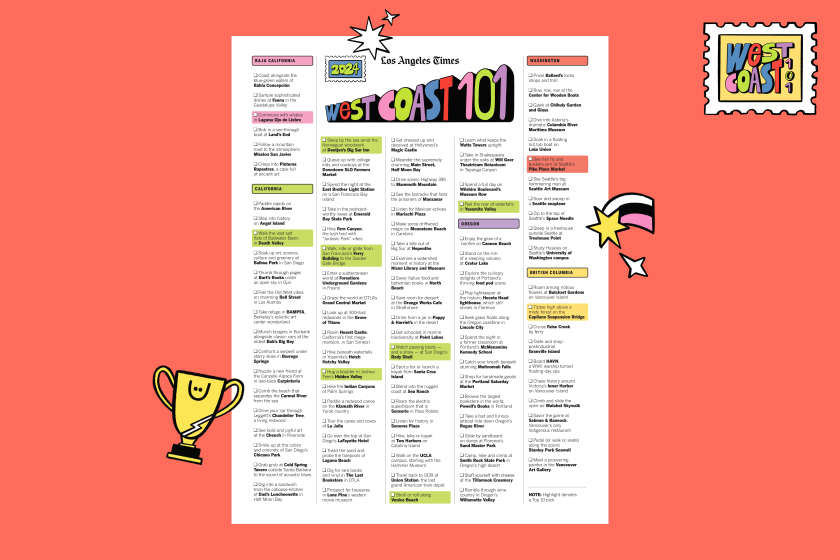Europe: Buyer’s Market for Summer
Americans, reacting to recent international terrorism by canceling European vacations, may regret the decision to travel closer to home this summer.
For, say the nation’s travel writers, Europe suddenly has become a buyer’s market.
“This summer, travelers have the chance to see Europe the way it was meant to be seen--without being surrounded by American tourists,” says travel columnist Peter S. Greenberg, from Los Angeles. “Airlines are cutting prices to entice American travelers . . . summertime travelers are in for a terrific time, on a price basis alone . . . everything is in the traveler’s favor.”
And despite weakening and wavering values of the dollar, claim these impartial experts, Europe may still be the bargain of the season.
Herb Shannon, former travel and aviation editor of the Press-Telegram in Long Beach and now a free-lance travel writer, says: “People are going to discover by midsummer that Europe is wide open, unless something else (another terrorist incident) happens.
“It’s going to be a real picnic for independent (non-tour group) travelers. They’re going to have a ball--no problems with reservations, air fare is down. Prices are down. Down . This will be the best year ever for independent travelers. They’re going to save a bundle.”
‘The Best Summer’
San Francisco Chronicle syndicated travel columnist Stan Delaplane agrees. “This is the best summer for tourists,” he said. “They’re being treated to lower air fares, and package deals. At any other time it would be impossible to get a hotel reservation between June and September at a favorite spot of mine at Lake Como, Italy. But now they said: ‘Come. Anytime you want.’ ”
Yet, reported the U.S. Travel Data Center, public apprehension persists. According to the center, a Washington-based, nonprofit organization studying Americans’ vacation activities, fear of terrorism has caused 1.8 million persons to cancel or change their travel plans. The point is, say travel writers, that there are no guarantees for individual safety--at any time or any place.
“ Nobody can guarantee that you are safe anywhere you choose to go. . . . We need to be alert to terrorism but we should not write off Europe because terrorism has happened there,” says Mary Lu Abbott, travel editor of the Houston Chronicle.
But what of the nervous and indecisive traveler who still is split between Monterey and Monte Carlo?
“As long as you feel comfortable going, then go. If you don’t, don’t go,” advises Abbott.
Judith Morgan, a La Jolla writer who has written a travel column for 12 years, says she has received many calls from readers seeking advice about traveling to Europe this summer.
“The unpredictable quality of terrorism is very unappealing,” said Morgan. “So much depends on the individual attitude and an individual’s approach to life. Terrorism has brought out a lot of individual fears . . . the decision has to be up to you. If you are really bothered, really upset; you are better off not going.”
Robert S. Kane of New York, author of the “World At Its Best” travel guides, has spent 20 years traveling and writing. He is working on his 17th book. Degrees of fear and apprehension, he believes, are a reality. But he sees the sophisticated traveler as being less apprehensive.
Despite the fact that an estimated 6 million U.S. tourists journeyed to Europe last year, he said, the great majority of Americans have never ventured overseas.
“Tour groups are the most apprehensive and so are the people with no European experience at all,” commented Kane.
Public Overreaction
While signs of fear and apprehension are obvious, public overreaction to international tensions is clear to many travel writers.
“People are definitely overreacting,” says columnist Greenberg. “I’m more scared of bad airline food than of terrorism.”
Tourists Overreacting
Fellow travel columnist Frank Riley of Los Angeles, recently returned from a three-week European trip, agreed. Tourists definitely are overreacting, he said, and ironically at a time when European welcomes seem to be the warmest.
“I visited Switzerland, eastern France, the Black Forest, and the friendliness to Americans was outstanding,” he said. “There was much welcome all along.”
Delaplane didn’t go to Europe to measure the anxieties of the traveling public. Instead, he went to lunch, to San Francisco’s Washington Square Bar & Grill, which, Delaplane insists, the city’s most knowledgeable people frequent.
“Everyone had heard about it (terrorism) and read about it, but nobody knew anybody who had actually canceled (plans),” commented Delaplane.
Statistical Contrasts
In recent months, travel writers and national commentators have been quick to report statistical contrasts between casualties of terrorism and victims of domestic incidents.
State Department figures show that 28 Americans died as a result of terrorism in 1985.
But the National Safety Council in Chicago reports that in 1985 in the United States 5,900 persons died from falls at home, 3,900 died from fires and burns and 3,000 died from being poisoned.
“I think common sense should replace hysteria,” commented Abbott. “Airlines are being very strict about safety. Countries really have cracked down to catch these people (terrorists). There is an awareness on all peoples’ part that we have a problem here. There is reason to be alert but I think it’s time to stop saying Europe is not safe.”
Judith Morgan says that those returning from European vacations have had a “wonderful time” due largely to European friendliness.
“The friendliness in the air is almost palpable,” she said. “Europeans are seeing the traveler as an individual instead of seeing the crowd.
“The people I know who have gone were so happy. They lingered longer at sidewalk cafes, they visited small towns instead of big cities or they rented cars and just took off--like the Europeans do.”
Sign up for The Wild
We’ll help you find the best places to hike, bike and run, as well as the perfect silent spots for meditation and yoga.
You may occasionally receive promotional content from the Los Angeles Times.



